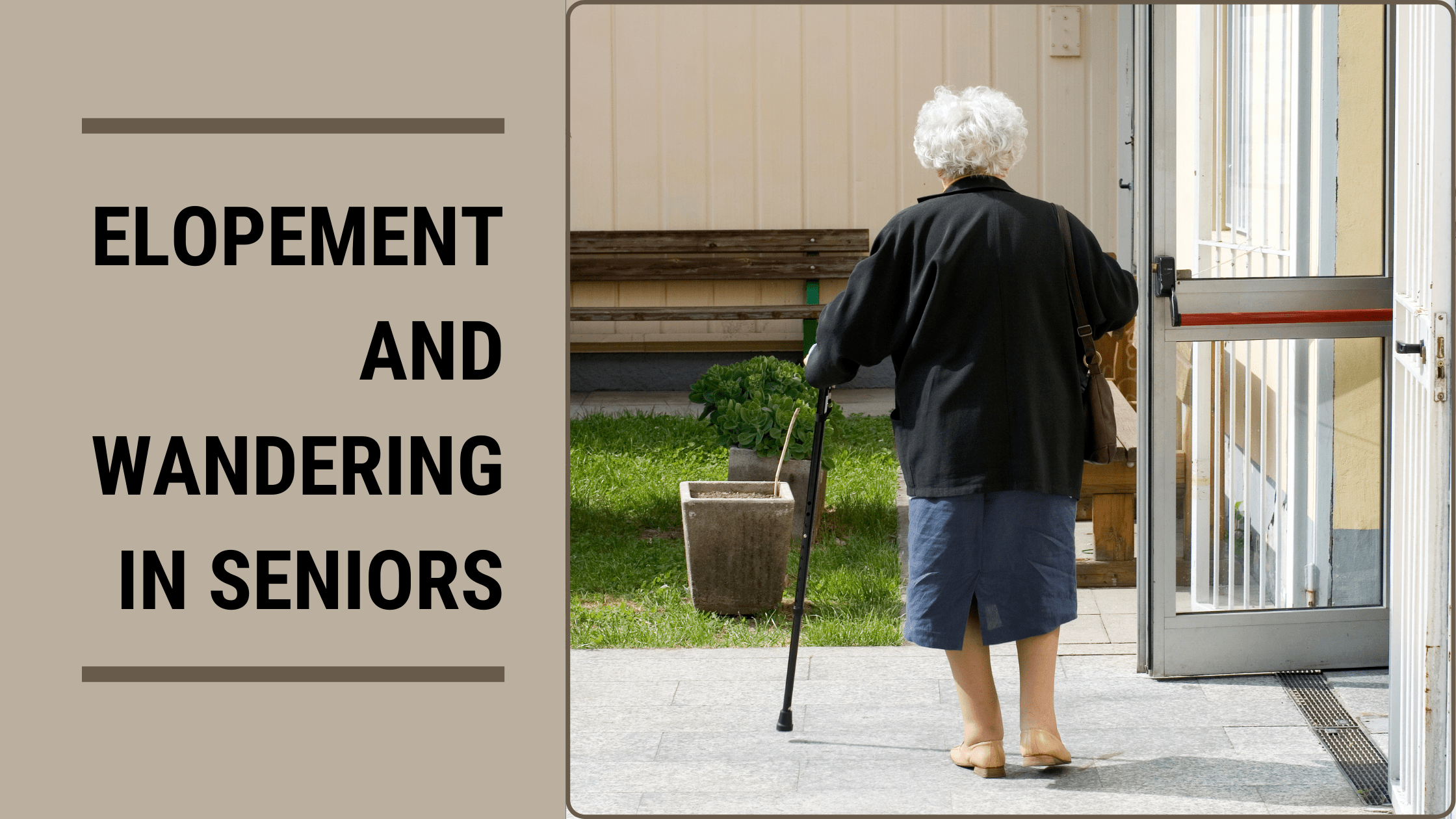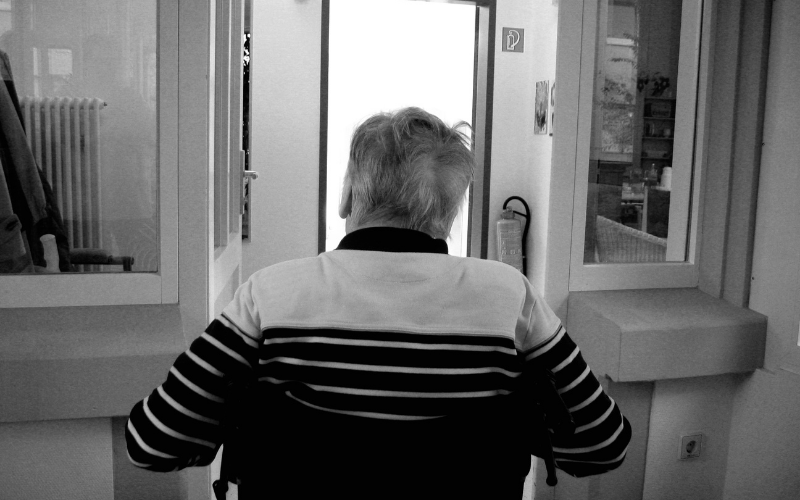
For both you and your loved one with dementia, wandering is a terrifying, nerve-wracking situation. It’s something no one ever wants to experience — but if your loved one has dementia or Alzheimer’s, wandering and elopement are genuine risks for which you should prepare. These behaviors may be challenging to understand, but doing so can help you as a family caregiver meet your loved one’s needs.
Updated June 27, 2022
For Elders With Dementia, Wandering Can Be Devastating
Unfortunately, these incidents happen often, particularly in those with cognitive decline. Every year, over 34,000 Alzheimer’s patients aging in place elope, while wandering occurs in 24% of nursing home patients.
As the country’s elderly population ages, these figures will rise. But with more awareness and a better understanding of these behaviors, you can take the first steps toward protecting your loved one and preventing elopement.
Wandering Vs. Elopement
Many people often use wandering and elopement interchangeably, but they aren’t the same. Wandering is a common sign of cognitive decline that may eventually lead to elopement.
If your loved one lives in a nursing home, for example, he or she may wander from a safe place but remain in the facility. On the other hand, elopement is when an individual leaves their home altogether.
Wandering
According to the CDC, wandering is “when someone leaves a safe area or a responsible caregiver. This typically includes situations where the person may be injured or harmed as a result.”
Wandering is a common sign of dementia, with 60% of patients exhibiting wandering behaviors, according to the Alzheimer’s Association. In many cases, wandering can lead to elopement.
Elopement
Elopement is when an individual with cognitive loss leaves a secure place such as their home or an institutional setting. It can occur at any age and can be intentional or unintentional.

Older adults often use their vehicles to elope. So, if you suspect your loved one may wander or elope, you should regularly assess their driving and cognitive abilities.
Elopement jeopardizes the person’s health and safety, especially if they elope during dangerous weather and endure prolonged exposure. A 2011 NCBI study of 325 elopement cases in dementia patients found that 30% of individuals died before being found. This alarming figure emphasizes why learning about eloping in seniors is so important for caregivers and families.
Understanding Dementia & Wandering
The phrase “wandering” is often associated with aimlessness, even though the individual wandering can move from place to place. It may not seem like it, but somebody who wanders shows that they:
- Can interact with their surroundings
- Have interests
- Can communicate and engage with others

“Walking is not a problem in itself – it can help to relieve stress and boredom and is good exercise. But as with all behaviour, if a person with dementia is walking about – and possibly leaving their home – it could be a sign that they have an unmet need. By understanding what they need and looking for solutions, you can help to improve their wellbeing.”
UK Alzheimer's Society
In other words, wandering behaviors indicate what the individual is still capable of doing. In fact, the UK Alzheimer’s Society doesn’t use the term “wandering.” Instead, it uses the phrase “walking about.”
Because, as this factsheet explains, “Walking is not a problem in itself – it can help to relieve stress and boredom and is good exercise. But as with all behaviour, if a person with dementia is walking about – and possibly leaving their home – it could be a sign that they have an unmet need. By understanding what they need and looking for solutions, you can help to improve their wellbeing.”
For example, an older adult may repeatedly ask for their mother or state a desire to go home while walking about. But they may not be looking for these things at all — instead, they might seek to satisfy an intrinsic need for comfort, acceptance, belonging, purpose, or something else. In these situations, you should provide a safe and secure environment to help fill this need.
Dementia Wandering Risk Factors
In many cases, older adults who wander or elope once will continuously try it again. You can decrease the likelihood of successful attempts by recognizing which signs act as a precursor to elopement, including:
- Cognitive decline or diagnosis
- Agitation or restlessness
- Efforts to open doors
- Previous patterns of wandering or elopement attempts
- Expressing a desire to leave the current location for work, home, or somewhere else
In addition, there is an exceptionally high risk for elders living in a care facility who can move about freely or could be potentially confused by visitors.
Dementia Wandering Risk Assessment
If your loved one has a history of elopement or wandering, there is a high chance of it happening again. You should talk to your parent’s doctor as soon as possible and consider an in-home caregiver to ensure your loved one’s safety.
When you discuss your loved one’s behavior with a medical provider, be prepared to answer questions such as:
- When did your loved one first start wandering?
- How often does wandering or elopement happen?
- Does the behavior occur more often during the day or night?
- Do things like noise, discomfort, or distress trigger wandering?
- When your loved one with dementia wanders, does it appear random or regular (pacing, lapping, etc.)
- Does your loved one seem to have a reason for wandering?
Does your loved one have anxiety or depression? These can contribute to wandering-like behaviors and elopement.
Review these questions every three months and whenever your loved one’s physical, mental, or emotional health notably changes.
How To Avoid Wandering
Once you know your loved one’s risk for wandering or elopement, you can take preventative measures like the following:
Regular Activities
Scheduling daily activities can keep your loved one focused and promote a sense of purpose. Moreover, daily exercise and socialization can go a long way to minimizing wandering behaviors.
If your loved one still lives at home, you can hire a professional caregiver to monitor them and assist with these activities when you are unavailable.
Wandering Alarms For Dementia
As the number of older adults in the US grows, so will the amount of technology for aging in place. There are many alarm systems available for any need or budget to notify you when your loved one leaves their home.
The Alzheimer’s Association offers many services for elders with a history of wandering. The Safe Return program, for example, is an around-the-clock national emergency response system that alerts law enforcement when an elder with dementia wanders or elopes.

Furthermore, several states now have “Silver Alerts,” which, like Amber Alerts, broadcast notifications about missing older adults to locate them faster. You can also use the GPS on your loved one’s phone, but there’s no guarantee they’ll have it on their person. Instead, you may consider a bracelet or anklet with a built-in GPS to track their location.
Hire A Caregiver
Caring for a loved one can be challenging, but dementia can make it even more difficult. Cognitive loss can require specialized care that you as a family caregiver may not be able to provide.
Moving to an institutional setting is one option, but these facilities are often expensive and could worsen wandering behaviors. Instead, you could work with a part-time or full-time caregiver who can give your loved one the specialized care their condition requires.
MeetCaregivers Can Help
Wandering and elopement jeopardize your loved one’s health, safety, and overall wellbeing. It’s essential to recognize the signs and understand the reasons behind your loved one’s behavior so that you can prevent it.
If your loved one has dementia or just needs assistance with activities of daily living, we can help. Call 1-888-541-1136 or contact us through our website. MeetCaregivers can work with you to match your loved one with the perfect caregiver.
For more resources and information, check out the Blog.
- “Disability and Safety: Information on Wandering (Elopement).” Centers for Disease Control and Prevention, Centers for Disease Control and Prevention, 18 Sept. 2019, https://tinyurl.com/kpxef7pf.
- Heerema, Esther. “How Can Elopement in Dementia Be Prevented?” Verywell Health, 14 Jan. 2020, https://tinyurl.com/t3e8mmu7.
- Jackson, Sharon. “I Want to Go Home! What Elopement and Wandering Mean in Dementia.”
- Crisis Prevention Institute, https://tinyurl.com/3te6xsu7.
mmLearn.org. A Caregiver’s Guide to Wandering and Elopement, 30 Sept. 2015, https://tinyurl.com/zh8vyeh8. - “Nursing Home Elopement: What Does Elopement Mean?” Blasingame, Burch, Garrard & Ashley, P.C., 23 Feb. 2021, https://tinyurl.com/jccu2s3s.
- “Walking About.” Alzheimer’s Society, 30 Sept. 2020, https://tinyurl.com/2tjcsspe.
- “Wandering Patients, Elopement Prevention and Response.” Wandering Patients, Elopement Prevention and Response | Glatfelter Healthcare Practice, https://tinyurl.com/5fde78ka.
